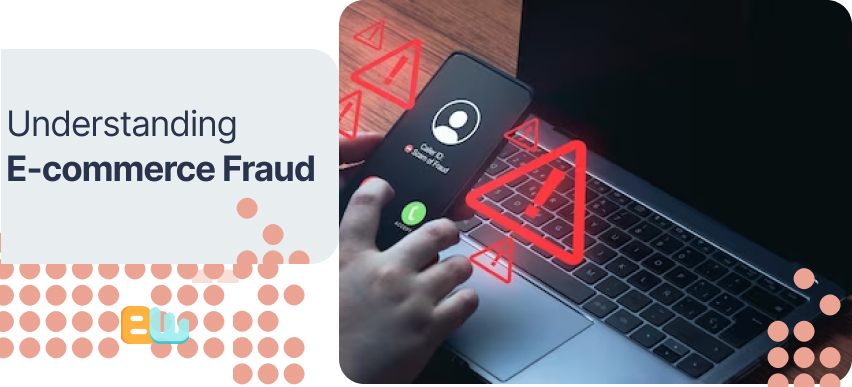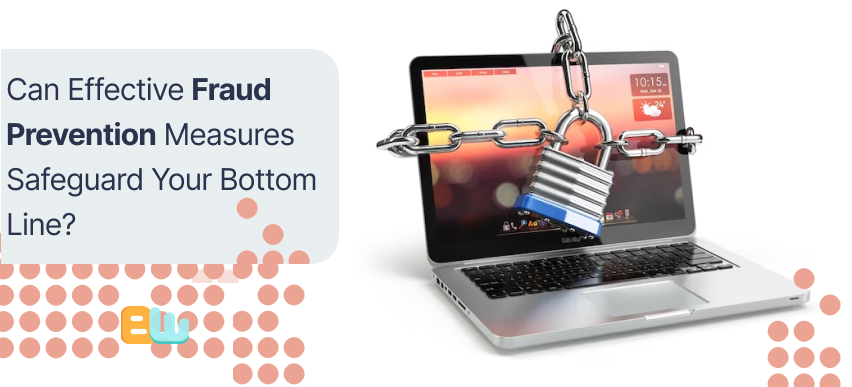
Small businesses have always been the backbone of the economy, but with the growth of e-commerce platforms, it has become easier for them to expand their reach. While this is a boon, it also exposes them to a higher risk of fraud. E-commerce fraud can take different forms and lead to significant losses for small businesses. In this blog, we will discuss everything you need to know about e-commerce fraud prevention. We’ll explain different types of fraud, what signs to look for that indicate fraudulent activity, and effective prevention measures that small businesses can implement. By understanding how e-commerce fraud works and taking proactive steps to prevent it, small businesses can protect their bottom line and ensure they can continue growing safely in the online marketplace.
Understanding E-commerce Fraud

E-commerce fraud encompasses unauthorized online transactions and fraudsters’ illicit use of stolen credit card information. Understanding these fraudulent activities is crucial for implementing effective prevention measures, as they can potentially harm small businesses financially. Protecting business revenue hinges on preventing e-commerce fraud through further investigation into inconsistencies, setting transaction limits, and implementing secure protocols.
Defining E-commerce Fraud
E-commerce fraud encompasses deceptive practices in online purchases, often involving unauthorized transactions and stolen customer data. Fraudsters commonly utilize stolen card details to make illicit purchases, jeopardizing customer trust and business reputation. The unauthorized use of credit card information is a prevalent form of e-commerce fraud that small businesses must combat. Understanding the types of fraud and the motives behind them is crucial to implementing effective prevention measures.
Key Motivations behind E-commerce Fraud
E-commerce fraud primarily involves seeking financial gain, exploiting vulnerabilities in online payment systems, and making fraudulent purchases. Fraudsters are motivated by the opportunity to exploit e-commerce transactions for personal gain, driven by the desire for monetary benefits presented by the rise of e-commerce. Financial fraud through e-commerce enables fraudsters to exploit opportunities for financial exploitation and jeopardize small businesses’ financial stability.
Recognizing Various Types of E-commerce Fraud

Recognizing the different types of e-commerce fraud, such as credit card fraud and account takeover, is crucial for effective prevention. E-commerce fraud encompasses a range of illicit activities, including credit card fraud, chargeback fraud, and identity theft. Understanding these various types of e-commerce fraud is essential for implementing robust security protocols and preventive measures, such as setting limits, further investigation, and requiring CVV numbers for purchases. By identifying and addressing the specific types of fraud online retailers may encounter, businesses can better safeguard themselves and their customers against online payment fraud.
Fraud through Credit Cards
Unauthorized use of card information for purchases characterizes fraud through credit cards. Fraudsters exploit stolen credit card details, making unauthorized transactions and affecting small businesses. Robust security measures are essential to prevent such fraudulent activities, including monitoring unusual buying patterns, implementing address verification services, and emphasizing secure protocols. Preventing friendly and chargeback fraud also requires understanding the types of fraud and conducting regular site security audits. To protect customer names and sensitive data, E-commerce businesses must stay vigilant against online payment fraud, especially during the holiday season.
Account Takeover Fraud
Unauthorized access to customer accounts for fraudulent activities characterizes account takeover fraud. Preventing this type of fraud necessitates multifactor authentication and continuous monitoring. Fraudsters exploit unauthorized access to customer accounts to carry out fraudulent transactions, posing a significant threat to e-commerce security and customer trust. Small businesses must safeguard against account takeover fraud to protect sensitive customer data and uphold the integrity of their online platforms.
Chargeback Fraud
Chargeback fraud occurs when unauthorized transactions are disputed by fraudsters aiming to obtain refunds. Preventing this type of fraud involves thorough verification of customer data and orders. The impact of chargeback fraud can lead to financial losses and damage a business’s reputation, especially for small businesses. Implementing measures to mitigate the risks of chargeback fraud is crucial to safeguarding revenue and preventing customer disputes.
Phishing and Interception Frauds
Phishing and intercept fraud are deceptive tactics used to obtain sensitive customer information. Fraudsters employ various phishing techniques, leading to identity theft and unauthorized data access. It’s crucial to educate customers on online security to prevent such fraud. Small businesses should proactively implement measures to combat phishing and interception frauds, safeguarding their customers’ sensitive data and maintaining trust.
Identifying Signs of Fraudulent Activity

Proactively identifying signs of fraudulent activity is essential for early detection and prevention in small businesses. Monitoring unusual purchasing patterns and account access is crucial, as it helps recognize suspicious activities preventing fraudulent transactions and data breaches. By identifying red flags of fraudulent activity, businesses can ensure timely intervention and safeguard their operations and customer trust. This proactive approach to identifying fraudulent activity plays a vital role in protecting the bottom line of small businesses and maintaining a secure e-commerce environment.
Inconsistencies in Order Data
Inconsistent order data, such as mismatched billing and shipping addresses, may signal fraudulent activity. Monitoring and resolving these inconsistencies is crucial for fraud prevention. Fraudsters often try unauthorized purchases using stolen personal information. Resolving order data discrepancies is vital for safeguarding customer information and preventing fraud. Small businesses must authenticate order data to identify and counter potential fraudulent activities.
Unusual Buying Patterns and Locations
Be attentive to purchases with uncommon patterns and locations to identify suspicious behavior. Look for frequent buying activity from atypical places, which can signify fraud. Monitor customer information for unusual location details to combat triangulation fraud. Employ machine learning to detect and flag unusual location activities on the platform. Stay vigilant for unauthorized purchases from unfamiliar or strange locations.
Multiple Transactions from Different Cards
Be cautious of irregular transaction behavior, including attempts from multiple card numbers, as it may indicate potential fraud. Implement security measures to identify and prevent fraudulent card testing activities. Utilize security codes to protect against unauthorized purchases from different cards. Look out for stolen credit card information used for fraudulent transactions on the platform. Stay vigilant and employ security protocols to combat the misuse of multiple payment cards.
Implementing E-commerce Fraud Prevention Measures

Strengthening security with effective e-commerce fraud prevention measures is crucial for small businesses. Enhancing customer data security and protecting the bottom line requires proactive strategies and stringent measures in place. Safeguarding the e-commerce store from fraud and boosting customer experience is essential. Implementing e-commerce fraud prevention solutions is critical to mitigating risks associated with various types of fraud, such as friendly fraud, account takeover fraud, and phishing. It’s imperative to monitor for suspicious activity, apply address verification services, and emphasize secure protocols to combat online fraud effectively.
Regular Site Security Audits
Conducting routine security audits and vulnerability checks is crucial to identify and address potential vulnerabilities on your website. Regularly reviewing and updating security protocols can mitigate susceptibility to fraud and ensure enhanced website security. These security audits also help identify and rectify potential security gaps on the platform. It’s essential to conduct frequent audits to detect and address vulnerabilities, safeguarding your e-commerce business from online fraud and unauthorized access.
Importance of PCI Compliance
Safeguard sensitive customer data and payment information by prioritizing PCI compliance. Adhere to PCI standards to protect customer credit card details and prevent fraud. Uphold PCI compliance to fortify security and avoid e-commerce fraud, ensuring safe online transactions. Comply with PCI Security Standards Council guidelines for secure online payment processes, mitigating susceptibility to fraud.
Monitoring Site for Suspicious Activity
Regularly monitoring the online store for any unusual account behaviors and implementing security measures to detect and prevent fraudulent activities is crucial. Keeping a close eye on the platform for any signs of fraudulent activities or suspicious account logins is essential. Utilizing monitoring tools to detect and address suspicious activities is vital in safeguarding the e-commerce platform. Additionally, staying vigilant in monitoring customer data for fraudulent activities or unauthorized purchases can help prevent potential fraud.
Applying Address Verification Service (AVS)
By implementing an address verification service, you can verify customer billing and shipping addresses, authenticate customer details, and prevent fraud. This strengthens security by validating customer addresses and enhancing overall security measures. Address verification service helps safeguard against e-commerce fraud by ensuring the accuracy of customer data. It’s a crucial step in preventing friendly fraud and unauthorized transactions. Utilizing this service adds extra protection to your online retail business, especially during peak periods like the holiday season.
Requiring CVV Numbers for Purchases
By mandating the inclusion of CVV numbers for all online credit card purchases, you can significantly enhance the security of transactions on your e-commerce platform. Requiring the input of CVV numbers adds an extra layer of protection and verification, effectively preventing unauthorized credit card usage. This mandatory requirement also promotes customer data security, emphasizing the importance of inputting CVV numbers for secure online payment transactions. By implementing this measure, you can effectively prevent online fraud and protect your customers’ sensitive data.
Emphasizing Secure Protocols (HTTPS)
To safeguard customer data during transactions, prioritize implementing secure HTTPS protocols. It’s essential to ensure the e-commerce platform uses HTTPS for safe online transactions, enhancing customer data security and optimizing overall security. Secure HTTPS protocols protect sensitive customer information, emphasizing their importance for all e-commerce transactions. By utilizing HTTPS, online retailers can provide a secure environment for payment card industry compliance, safeguarding against various types of e-commerce fraud. Enhance security measures by emphasizing HTTPS protocols, reassuring customers, and preventing online fraud.
How Does Ignorance Make Small Businesses Vulnerable to E-commerce Fraud?

Ignorance can make small businesses vulnerable to e-commerce fraud in several ways. Firstly, many small business owners may need to be made aware of various online scams and fraudulent activities, leaving them ill-prepared to detect and prevent such incidents. This lack of knowledge can lead to a false sense of security and make them an easy target for fraudsters. Additionally, small businesses may need more resources or expertise to implement robust security measures, making their systems more susceptible to breaches. Furthermore, knowledge about the importance of data protection and secure payment processing can result in adequate safeguards being put in place, putting sensitive customer information at risk. Small businesses must educate themselves about e-commerce fraud and proactively protect their online operations from potential threats. By staying informed and implementing effective security measures, small businesses can significantly reduce their vulnerability to e-commerce fraud.
Can Effective Fraud Prevention Measures Safeguard Your Bottom Line?

Effective fraud prevention measures can significantly safeguard your bottom line and protect your business from financial loss. With the increasing sophistication of fraudulent activities, it has become crucial for companies to implement robust systems and strategies to detect and prevent fraud. Businesses can proactively identify suspicious activities and take immediate action by investing in AI-powered fraud detection software and biometric authentication technologies. Furthermore, implementing strict internal controls, conducting regular audits, and educating employees about fraud risks can create a strong defense against fraudulent behavior. While no system is foolproof, implementing effective fraud prevention measures can significantly minimize the risk of financial losses and help businesses maintain a healthy bottom line.
Conclusion
In conclusion, small businesses must prioritize e-commerce fraud prevention to protect their bottom line and ensure the sustainability of their operations. Understanding the different types of e-commerce fraud and recognizing the signs of fraudulent activity is crucial. By implementing effective fraud prevention measures such as regular site security audits, PCI compliance, monitoring for suspicious activity, applying address verification service, and requiring CVV numbers for purchases, small businesses can significantly reduce their vulnerability to fraud. Ignorance about the risks of e-commerce fraud can leave small businesses exposed. Investing in robust fraud prevention measures is essential to safeguard your business’s financial health and reputation. By taking proactive steps to prevent fraud, small businesses can focus on delivering a seamless and secure online shopping experience for their customers.
